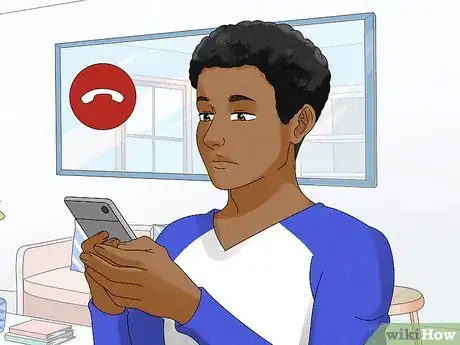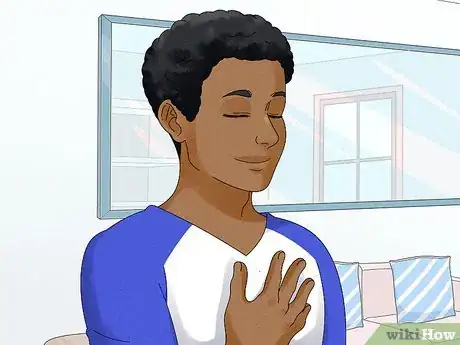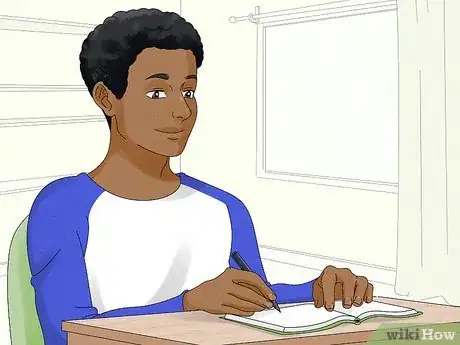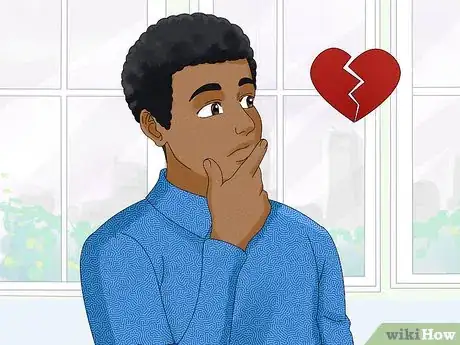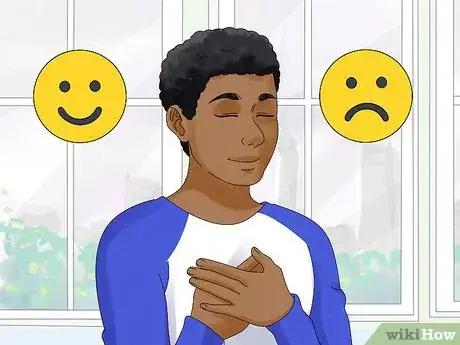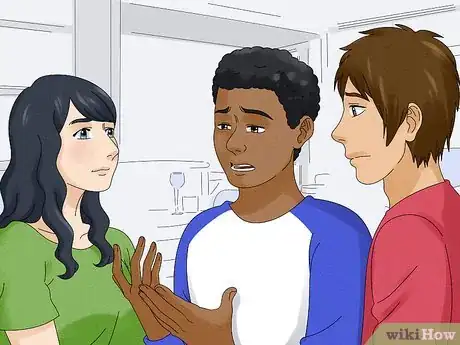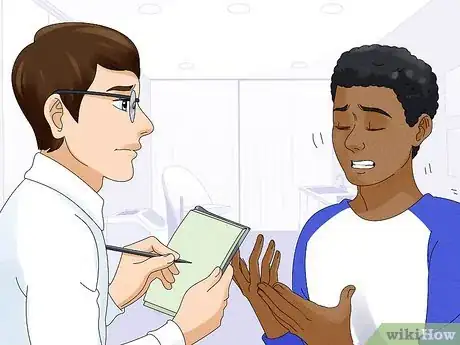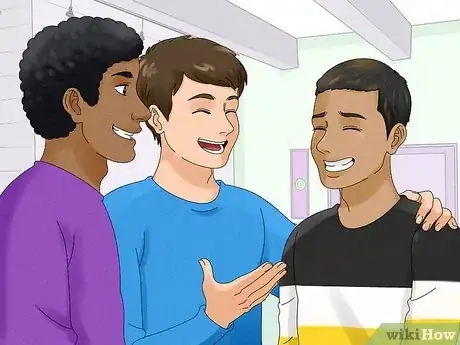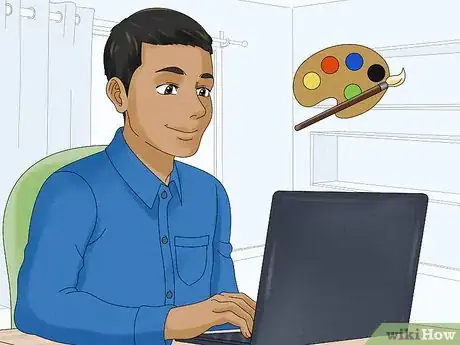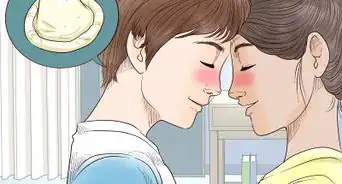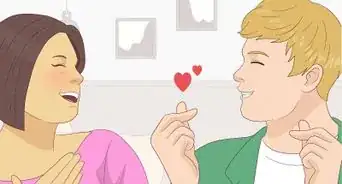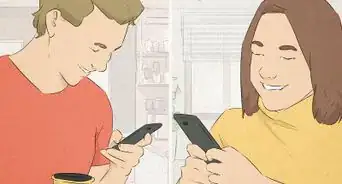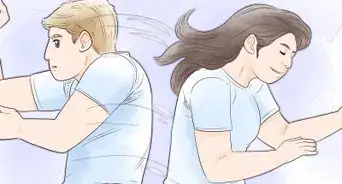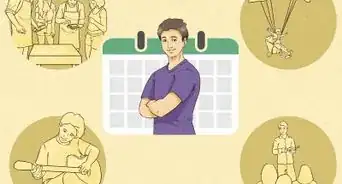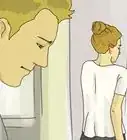This article was co-authored by Connell Barrett and by wikiHow staff writer, Amber Crain. Connell Barrett is a Relationship Expert and the Founder and Executive Coach of Dating Transformation in New York City. Connell has over five years of experience as an international coach who helps men connect with women by unlocking their best, true, most confident selves. He is the author of the Amazon bestseller “Dating Sucks but You Don’t,” and has appeared on Good Morning America, the "Today" show, Access Hollywood, and in Best Life, Cosmopolitan, and The Oprah Magazine. In 2019 he was named Datezie.com's “New York City’s Best Male Dating Coach."
There are 9 references cited in this article, which can be found at the bottom of the page.
This article has been viewed 44,746 times.
Rejection hurts and it’s easy to get caught up in those painful feelings–especially if you just got rejected by your crush. If you're having a hard time moving forward after being rejected, you aren't alone. Everyone gets rejected at some point! To get over this, start by cutting off the person who rejected you and don’t check in on their social media. Then, occupy your time with healthy and productive distractions—like hanging out with your friends or pursuing hobbies. With a little bit of time, you’ll stop obsessing over someone and start healing.
Steps
Dealing with Rejection
-
1Cut off contact with the person who rejected you. It's tough to stop thinking about someone if you keep communicating. If you don’t want to cut this person out of your life completely, at least make a firm decision to take a break from them until you start feeling better.[1]
- Stop following them on social media and stop replying to their texts and calls. If you run into them in person, keep your interaction short and sweet.
- They may want to return to a normal friendship (and perhaps you'll be on the same page one day) but just let them know you're not ready for that yet.
-
2Give yourself time and space to deal with your emotions. It’s normal to feel sadness, anger, and self-doubt after being rejected. Repressing those feelings isn’t good for you, though, so give yourself a chance to deal with them properly. That way, you can put them behind you and move forward.Advertisement
-
3Put an end to negative self-talk. The way you talk to yourself can affect you deeply. Whenever you notice a negative thought pop into your mind, immediately counter it with a positive one. Try to think of your inner critic as separate from yourself. To take the critic's power away, talk back! Over time, this trains your brain to look at things in a more positive way.[4]
- If you find yourself thinking, "I'm just not likable enough," challenge that with something positive like, "Hold up, my friends and coworkers adore me! My personality is not the problem."
- If you catch yourself thinking, "I'm just not attractive enough," counter that with something like, "When I look in the mirror, I like the person I see."
- If you find yourself thinking, "No one will ever want to date me," challenge your inner critic with: "Actually, only one person rejected me. There are 7 billion people on this planet. Of course someone will want to date me!"
-
4Write a love letter to yourself. No one will ever see this letter—it's for your eyes only. In the letter, list all the qualities you love about yourself. Next to each quality, describe times in the past when someone appreciated that quality.[5]
- You can write this "letter" in your journal if you have one.
- Go back and reread your letter in the future whenever you're feeling down.
- Write about yourself with the same kindness you'd use to describe a friend.[6]
-
5Look at this as a learning opportunity. Rejection is a part of everyone's life. Now that you know how rejection makes you feel, you'll be better prepared for it in the future. You'll come out on the other side of this situation feeling stronger, wiser, and better equipped to take meaningful risks.[7]
- Try asking yourself questions like:
- What did I learn about myself through this experience?
- Did I react in unexpected ways to the rejection? If so, why?
- If I could go back, would I do anything differently?
- Try asking yourself questions like:
-
6Put the rejection in perspective. Even though you're hurting now, you won't always feel this way. It's a bit cliche to say but that doesn't make it any less true: time does help you heal. In the meantime, remember that rejection doesn't define who you are. You're much more interesting and complex than that; you have so much to offer.[8]
- Keep in mind that rejection creates new opportunities, too. You might meet someone incredible in the near future! That opportunity could have passed you by if you were already dating someone.
-
7Reach out to supportive friends and family. Connect face-to-face with friends and family members when you can, but phone calls, texting, and video chats are great, too. Sharing your feelings with someone you trust can help you feel less alone.[9]
- Everyone has been rejected at some point, so your loved ones can probably help you put what happened into perspective.[10]
- Whether it is sadness, anger or fear, our emotions need to be felt through to completion with someone that will hear, support, and be there with us. When we can do that, healing starts to happen.
-
8See a therapist if you're still struggling. If you don’t feel like you’re improving, there’s nothing wrong with seeking out professional help. Counselors and therapists are trained to help people heal and deal with problems. They can give you advice, teach you positive coping skills, and help you better understand why you're feeling certain ways.[11]
Healthy Distractions
-
1Focus on the good things in your life. Rejection hurts and it’s normal to find yourself thinking about it a lot. If you want to shift your mindset, though, take stock of all the wonderful things you still have. Your friends, family, hobbies, skills, and passions make life worth living! The person who rejected you can’t take those things away.[12]
- Try making a gratitude list to reconnect with the good things in your life. If you’re struggling, ask someone you trust for help.[13]
-
2Get back into your old hobbies. Spend some time thinking about your favorite activities and pastimes. Maybe it’s been a while since you picked up your guitar, hit the hiking trail, tried a new recipe, or checked out the latest blockbuster. Whatever it is, throw yourself back into it with enthusiasm.[14]
- If you loved cycling as a kid, air up those old bike wheels and get back out there. Join a local cycling group or look online for the best bike trails in your area.
- If you used to read sci-fi thrillers by the dozens, check out the newest titles at a nearby bookstore. Pick a few books that look appealing to you and dive in.
-
3Push yourself to try new things. Exploring new things, both big and small, helps remind us that there’s a whole world out there full of opportunities and possibilities. It can be tough to put yourself out there at first, but start by trying just one new thing. It doesn’t have to be anything big. Start small and go from there.[15]
- For example, if you’ve always wanted to explore your creative side, sign up for an online drawing or painting course. If you’ve always want to get fit, get a gym membership and make it your goal to show up once a week.
-
4Plan fun activities with family and friends. Try to avoid isolating yourself right now. Even if you don’t feel like it, call up some of your favorite people and make some plans. You’ll give yourself things to look forward to! Plus, those positive social interactions will boost your mood and self-esteem.[16]
- If you don't feel like going out, plan a movie marathon with your besties.
- Make standing plans to create a new tradition. For example, plan to meet your sibling in the park every Saturday for a picnic and hike.
-
5Put more time and energy into self-care. Self-care is different for everyone, so focus on doing things that truly make you happy and put you in a good state of mind. You might splurge on a new outfit, schedule a massage, take a bubble bath, get a new haircut, indulge in ice cream—it’s your call.[17]
- Try to do at least one positive thing a day to care for yourself.
- Implement long-term self-care rituals, too! For example, commit to eating a healthy diet. If you've always wanted to try yoga, check out beginner tutorials online or sign up for a class.
References
- ↑ https://teenhealthsource.com/relationships/dealing-with-rejection/
- ↑ https://teenhealthsource.com/relationships/dealing-with-rejection/
- ↑ https://www.loveisrespect.org/resources/dealing-with-rejection/
- ↑ https://www.psychologytoday.com/us/blog/living-forward/201603/4-ways-stop-beating-yourself-once-and-all
- ↑ https://www.psychologytoday.com/us/blog/lifetime-connections/202004/whats-the-best-way-ease-the-pain-rejection
- ↑ https://www.mayoclinic.org/healthy-lifestyle/stress-management/in-depth/positive-thinking/art-20043950
- ↑ https://teenhealthsource.com/relationships/dealing-with-rejection/
- ↑ https://www.loveisrespect.org/resources/dealing-with-rejection/
- ↑ https://kidshealth.org/en/teens/rejection.html
- ↑ https://www.psychologytoday.com/us/blog/lifetime-connections/202004/whats-the-best-way-ease-the-pain-rejection
- ↑ https://teenhealthsource.com/relationships/dealing-with-rejection/
- ↑ https://www.loveisrespect.org/resources/dealing-with-rejection/
- ↑ https://teenhealthsource.com/relationships/dealing-with-rejection/
- ↑ https://wellbeingtrust.org/news/its-not-you-its-me-6-ways-to-take-romantic-rejection-in-stride/
- ↑ https://www.psychalive.org/how-to-deal-with-rejection/
- ↑ https://www.apa.org/monitor/2012/04/rejection
- ↑ https://teenhealthsource.com/relationships/dealing-with-rejection/
